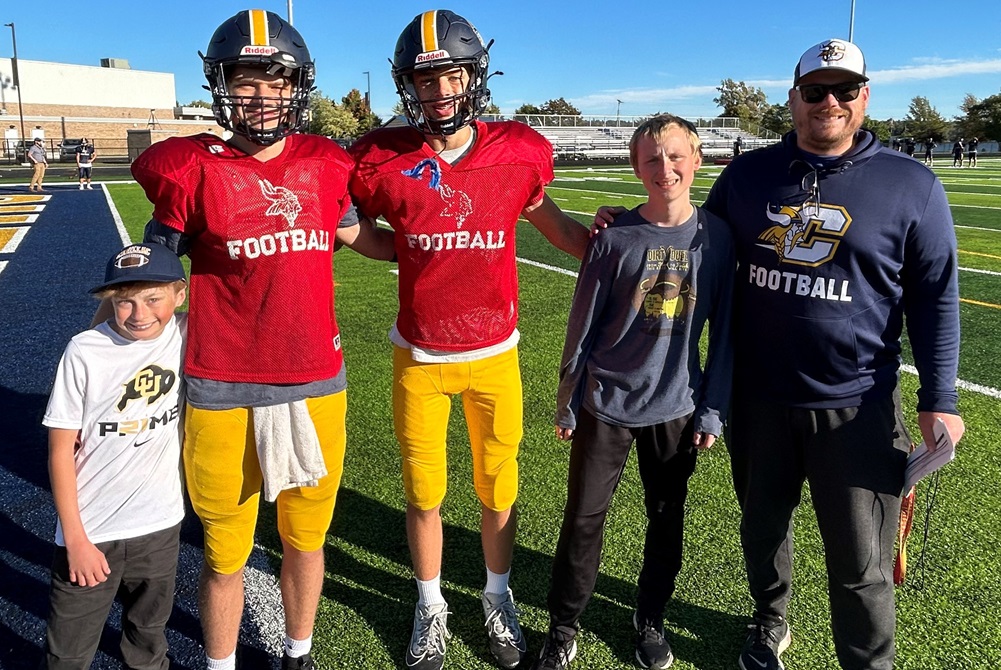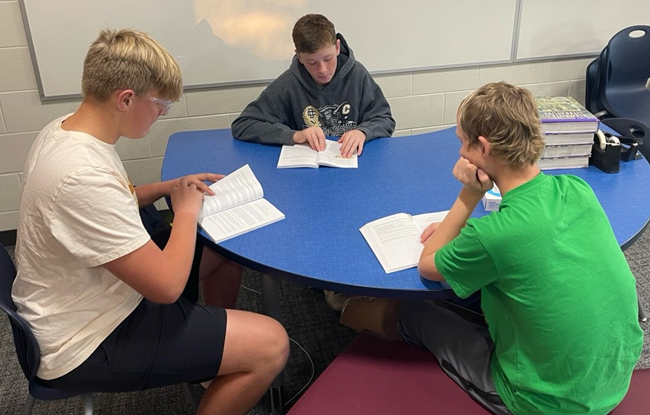
Mann Makes Great on High Expectations
By
Tom Markowski
Special for Second Half
April 20, 2017
BEVERLY HILLS – Entering high school, Steve Mann faced high expectations.
 His mother and father both experienced much success as student-athletes at Detroit Country Day, and his sister, Brittany, was one of the top track athletes to compete at and graduate from the school.
His mother and father both experienced much success as student-athletes at Detroit Country Day, and his sister, Brittany, was one of the top track athletes to compete at and graduate from the school.
But while it's still too early to tell, Steve might end up the best of the Mann bunch.
Steve, 18, has played varsity football and baseball for four seasons each at Country Day, earning all-state honors in football this past fall and baseball as a junior. Also an outstanding student, he has signed to continue his academic and baseball careers at Duke University, where he’ll end up unless he’s drafted by a Major League Baseball team this summer and offered a deal he can’t refuse – it’s possible he’ll be taken during the first five rounds.
Country Day varsity baseball coach Steve Lepkowski – a 1993 graduate of the school and former football assistant as well before taking over the baseball program in 2015 – said he’s never coached an athlete like Mann.
“Steve is going to be successful at whatever he does,” Lepkowski said. “He’s a four-year captain here. That’s as unique as you can get. We vote for that. And every year we re-vote, and (each) time we re-voted him in.”
Last season, Mann hit .396 with 25 RBI, 24 stolen bases and 27 walks. Through seven games this season, he’s hitting .536 with three home runs, 18 RBI, nine stolen bases and nine walks. He also is 3-0 pitching with a 1.65 ERA.
In football, Mann played defensive back, quarterback and receiver. He’s 6-foot tall, and his weight has fluctuated depending on what sport he is playing. For football, his playing weight was 195 pounds. For baseball he’s up to 210. Mann is a centerfielder who, out of necessity, also pitches for Country Day. He’s expected to be an outfielder at the next level.
With his Duke signing in November, Mann left a football future behind. But he has known for a while where he wanted to be next. Scholarship offers from a more prestigious baseball conference, the Southeastern Conference, fed Mann’s appetite. But he had his sights set on Duke (which plays in the Atlantic Coast Conference) early on, so when the scholarship offer came, that was the end of his recruiting process.
 “The scouts ask me, why Duke? Why not the SEC?" Lepkowski said. "Well, I said, Steve cares about academics. Duke has been number one with him all along. As a sophomore, I asked him, where do you want to go? It was Duke. So I talked with Duke. I know of the coaches there. And I told them I have a player here that wants to go to your school, and they asked who. I told them Steve Mann. They said, Steve Mann? He wants to come here? That was it. I call him the Shane Battier of baseball.”
“The scouts ask me, why Duke? Why not the SEC?" Lepkowski said. "Well, I said, Steve cares about academics. Duke has been number one with him all along. As a sophomore, I asked him, where do you want to go? It was Duke. So I talked with Duke. I know of the coaches there. And I told them I have a player here that wants to go to your school, and they asked who. I told them Steve Mann. They said, Steve Mann? He wants to come here? That was it. I call him the Shane Battier of baseball.”
If an explanation is needed, Battier helped lead Duke to an NCAA basketball championship after being at the forefront of Country Day’s Class B titles in 1995, 1996 and 1997. Battier was named Mr. Basketball by the Basketball Coaches Association of Michigan as a senior, and Mann is a leading candidate for the Mr. Baseball Award this spring.
Like Battier, Mann also is an outstanding student. He carries a 3.94 grade-point average, taking classes including honors English and advanced placement mathematics and Spanish.
And as for mentors, Mann has to look no further than his living room couch. His father, Steve, also played football, basketball and ran track at Country Day. He caught the winning touchdown pass in the 1986 Class C title game against Muskegon Catholic Central (Final score: 18-14). He went on to play football at University of Wyoming.
His mother, Kira (Lewis), played basketball, lacrosse and volleyball at Country Day before continuing her education at Penn.
Then there’s his sister, Brittany. A 2012 Country Day graduate, Brittany was the Lower Peninsula Division 2 discus and shot put champion as a junior and senior. Country Day won the team title her junior season. Brittany went on to compete at Oregon before graduating last year. She’s enrolled at Southern California and in pursuit of her master’s in communications.
At Oregon, Brittany set the school record in the shot put (57 feet, 4¾ inches) and helped lead her school to its first NCAA team title (2015) in 30 years. She was a four-time All-American.
“I had some big shoes to fill when I came here,” Steve Mann said of Country Day. “Since high school started, even in eighth grade, I knew baseball was going to be it. Before eighth grade I focused on being an athlete. With Brittany coming through Country Day, it was easy to see what I needed to do (to be successful). It was kind of like a competition. I want to be like you, but I want to be better.”
Individually, Mann and his sister are pretty much on par. But there’s that elusive team title he has yet to help win, though he has come close.
County Day lost in the Division 4 Football Final this past November, and last spring the Yellowjackets reached the Division 2 Quarterfinals in baseball before they were eliminated by Dearborn Divine Child, 4-3.
Mann has one more shot.
“I tell myself, I have to win a state championship,” he said. “We’re good enough to win it.”
Mann has always been around sports, even when he was too young to realize it. The year he was born was the year his father became an assistant football coach at Country Day. Whether he was the water boy, ball boy or just tagging along, Steve grew up watching sports.
 “I was always with my dad,” he said. “When I was 5, 6 years old, just being out there was great. My dad has taken me through this journey. It was a step-by-step process.
“I was always with my dad,” he said. “When I was 5, 6 years old, just being out there was great. My dad has taken me through this journey. It was a step-by-step process.
“Another big factor for me was Brittany going on her recruiting visits.”
When he was in the eighth grade, Steve Mann had the opportunity to meet Olympian Devin Allen through his sister. In 2016, Allen became the first man since 1956 to win the 110-meter hurdles at both the NCAA Outdoor Championships and U.S. Olympic Trials. Allen also played receiver on Oregon’s football team.
“I was star-struck,” Mann said. “He was so humble. How could you not want that for yourself?”
Mann is unassuming. Bragging is not a trait his household condones. Great athletes don’t have to tell you how good they are. Their actions do the talking.
His parents deserve much of the credit for this. A part of Mann’s training was to compete against athletes two and three years older to see, for one, how they train and, two, to see how much Mann needed to improve athletically to become like them.
“There were a lot of expectations,” his father said. “He is very self-driven, to live up to both the Mann name at Country Day and to create his own path. I’ve tried to teach him what it’s like to play at the next level.”
As an example, Steve Mann had his son train in the baseball offseason with Major League players who were home away from the game. This experience was not so much about throwing or hitting a baseball. It was about being around those who made it to see how they trained, what foods they ate and the like.
“I did a similar thing with him when he was in middle school,” Mann said of his son. “I’d have him train with the guys in high school, like a Jonas Gray (currently an NFL free agent) and a Bennie Fowler (Denver Broncos). I do that with my younger son, too.”
The Manns' third child is Brandon, who is 13 years old and about to complete the seventh grade. And, yes, Brandon Mann also plays baseball and football, and, yes, his is quite good at both.
 Tom Markowski is a columnist and directs website coverage for the State Champs! Sports Network. He previously covered primarily high school sports for the The Detroit News from 1984-2014, focusing on the Detroit area and contributing to statewide coverage of football and basketball. Contact him at [email protected] with story ideas for Oakland, Macomb and Wayne counties.
Tom Markowski is a columnist and directs website coverage for the State Champs! Sports Network. He previously covered primarily high school sports for the The Detroit News from 1984-2014, focusing on the Detroit area and contributing to statewide coverage of football and basketball. Contact him at [email protected] with story ideas for Oakland, Macomb and Wayne counties.
PHOTOS: (Top) Steve Mann starred as a multi-position football player during the fall and also pitches and plays outfield during baseball season. (Middle) Mann, here at the plate, could be drafted during the top five rounds in June. (Below) Mann prepares to unload a pass last fall. (Baseball photos by D’Andrea Parnell. Football photos by Scott Bertschy.)

Cadillac Freshmen Wing, Westinghouse Become Wingmen for Each Other
By
Tom Spencer
Special for MHSAA.com
October 18, 2024
Lawson Westinghouse has a wingman.
 He really has several, but arguably no one closer than Dominic Wing, the 6-foot-5 freshman starting quarterback at Cadillac High School.
He really has several, but arguably no one closer than Dominic Wing, the 6-foot-5 freshman starting quarterback at Cadillac High School.
Westinghouse is also a freshman at Cadillac. A couple of other freshman, lineman Tanner Johnson and wide receiver/linebacker Will Howell, also are standing ready and willing to support.
Westinghouse, an avid long distance runner, likely will never play a down on the football field for the Vikings. But he’s usually helping the quarterbacks with drills at practice and looks like a member of the coaching staff on the sidelines during games.
He’s taken all road trips with the Vikings, sitting right next to Wing on the bus. Unfortunately, the road trip string is likely to end tonight when the Vikings head to Marquette for a matchup with league and playoff implications. Cadillac goes into the game 4-3 overall with a 3-2 Big North Conference record. Marquette is 5-2, 4-1.
Westinghouse can’t make the trip because he’s battling sickness complications from chemotherapy. He was diagnosed with a rare bone cancer called Ewing Sarcoma a few years back.
He got good news earlier this season indicating he was cancer free, but had to return to chemo this week.
Wing, Johnson and Howell spend time daily with Westinghouse reading. Westinghouse had goals of reading the book “The Twin Thieves” by the end of the school year and trying to stay in school every day.
 The boys try to get Westinghouse through a few pages every day. Wing is his primary reading partner, having developed a close bond with Westinghouse since transferring to Cadillac from Morley Stanwood this fall.
The boys try to get Westinghouse through a few pages every day. Wing is his primary reading partner, having developed a close bond with Westinghouse since transferring to Cadillac from Morley Stanwood this fall.
They first met at a basketball game last winter at Cadillac. They reconnected on the first day of school this fall and sat side by side during road trips to Midland, Gaylord, Sault Ste. Marie and Greenville as Cadillac recovered from an 0-2 start winning four of its last five games heading into tonight’s contest.
“I had a bunch of friends (at Cadillac), so I came up for a game,” Wing recollected. “(Lawson) saw me there, and he came up and introduced himself.
The friendship started to really take off with the first day of school, the two freshmen said. “(Lawson) wanted to be on the field, and we started reading in the mornings, which was really nice,” Wing recalled.
The special bond has led to a looser game warm-up and become a key to Wing’s mental preparations. It may be even more critical than Wing’s off-field opportunities to consult with a former NFL quarterback, John Wolford.
“We both talk the whole time on the bus rides,” Westinghouse said.
Wing treasures the conversation.
“We connect on the bus,” Wing said. “Once we get off the bus, he’ll get my warm-up ball and he’ll come over and watch me warm up, and I think it is pretty cool.”
Second-year coach Nick Winkler, who also serves as a special education teacher for Cadillac, loves how the new quarterback has connected with Westinghouse, who may rank as the most popular kid in school.
“Dom does a really good job of looking out for opportunities to take some time with Lawson during games and practice,” said Winkler. “Playing quarterback is hard enough as it is, so to intentionally do that speaks a lot to Lawson and a lot of people in the program.”
Westinghouse said he loves football and running. He recently asked his parents to buy him a football, and he’s been secretly practicing away from the football field. He also has run the Mackinac Bridge Labor Day event both ways every year.
 One of the most memorable moments for Winkler, Wing, Howell, Tanner and Westinghouse is far from the best one though. Lawson found himself sick on the way back from the Sault victory, and the boys had an opportunity to comfort him and practice a little caregiving.
One of the most memorable moments for Winkler, Wing, Howell, Tanner and Westinghouse is far from the best one though. Lawson found himself sick on the way back from the Sault victory, and the boys had an opportunity to comfort him and practice a little caregiving.
“It was a late-night bus trip back, and Lawson gets sick,” Winkler said. “Those guys really helped him out — I think that speaks to their character.”
Another freshman, Ty Pettit, cannot play football due to a health condition, but also has been welcomed to the team. He participates in quarterback drills and serves as an equipment manger. He also serves as the resident prankster on the team, according to Winkler.
“I mostly hang out with the team and encourage them to do their best,” Pettit said of his role.
Without Westinghouse tonight, Wing will rely more on his consultation with Wolford, who first connected with Winkler in Green Bay. Wing is coming off completing 14 of 18 attempts for 200 yards in last week’s win. He has one touchdown pass and no interceptions.
Wolford played for the Los Angeles Rams from 2019-2022 and then during then during the 2023 season with the Tampa Bay Buccaneers. His first NFL start was in place of injured Jared Goff in the 2020 regular-season finale, and he led the Rams back into the playoffs with a 10-6 victory. He became the first quarterback to pass for more than 200 yards and rush for more than 50 in his NFL debut. He also backed up Matthew Stafford as the Rams won the 2021 Super Bowl.
‘‘Dominic’s grooming as a quarterback has not been normal,” said Winkler. “He has the opportunity to talk with an NFL quarterback every week if he wants to, and I would say that relationship would come second to what he and Lawson have developed.”
Wing will miss Westinghouse every time the offense comes off the field tonight.
‘I usually like to look for him and we give each other a little fist bump when I come off,” Wing said.
 Tom Spencer is a longtime MHSAA-registered basketball and soccer official, and former softball and baseball official, and he also has coached in the northern Lower Peninsula area. He previously has written for the Saginaw News, Bay County Sports Page and Midland Daily News. He can be reached at [email protected] with story ideas for Manistee, Wexford, Missaukee, Roscommon, Ogemaw, Iosco, Alcona, Oscoda, Crawford, Kalkaska, Grand Traverse, Benzie, Leelanau, Antrim, Otsego, Montmorency, Alpena, Presque Isle, Cheboygan, Charlevoix and Emmet counties.
Tom Spencer is a longtime MHSAA-registered basketball and soccer official, and former softball and baseball official, and he also has coached in the northern Lower Peninsula area. He previously has written for the Saginaw News, Bay County Sports Page and Midland Daily News. He can be reached at [email protected] with story ideas for Manistee, Wexford, Missaukee, Roscommon, Ogemaw, Iosco, Alcona, Oscoda, Crawford, Kalkaska, Grand Traverse, Benzie, Leelanau, Antrim, Otsego, Montmorency, Alpena, Presque Isle, Cheboygan, Charlevoix and Emmet counties.
PHOTOS (Top) From left, Ty Pettit, quarterbacks KaLenn Harsh and Dominic Wing, Lawson Westinghouse and Cadillac football coach Nick Winkler take a moment for a photograph during a recent practice. (Middle) Tanner Johnson, Will Howell and Westinghouse read “The Twin Thieves” together. (Below) Westinghouse keeps an eye on the action. (Practice photos by Tom Spencer; reading photo courtesy of the Cadillac athletic department.)

